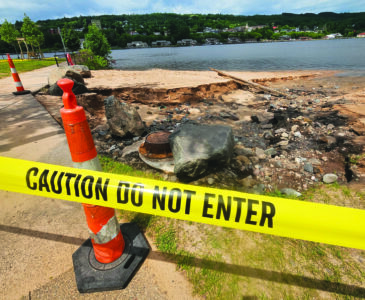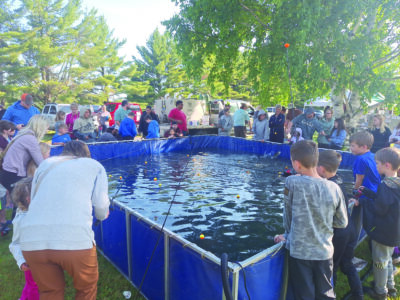Walkers step out to raise awareness of sexual assault
BARAGA – Victims of sexual assault can often feel too ashamed to seek out help, or simply not know where to look.
In an effort to destigmatize being a victim of abuse, the Keweenaw Bay Indian Community’s Office of Violence Against Women’s third annual Stepping out of the Darkness Sexual Assault Awareness Walk took place Friday, with a half-hour walk looping around the KBIC’s tribal center and casino. For the first time, the walk had an outside speaker – Native American journalist Vincent Schilling, who was sexually abused by two older men as a teenager. Attendees watched Schilling via a Skype connection.
The walk joined other KBIC efforts to combat and raise awareness of abuse. In 2012, it opened the Niimi Gimiwang Shelter Home in 2012, the tribe’s transition house for victims of abuse and their children. It also holds a walk in honor of Chelsey LaFernier, a tribal member who was the victim of domestic abuse culminating in her murder.
“We wanted to do something to just bring awareness of sexual assault in the community,” said Cherie Dakota, team leader for the Office of Violence against Women. “Since April is Sexual Assault Awareness Month, we decided after running (the shelter home) for a year, we decided to do something for sexual assault awareness.”
The walk shows victims there are people who care about the issue, and support victims and survivors of sexual assault.
“We’re getting information to people about the services that we have in the community, where they can go if they need to get forensic testing done in the hospitals, advocates who can work with them,” she said.
Schilling’s involvement is important, Dakota said, because it highlights what can be a hidden issue of male-on-male sexual assault.
Putting a spotlight on abuse can not only show support to victims, but also reach people who might have gone through something they hadn’t known was abuse, such as coercion or being assaulted while passed out, Dakota said.
“A lot of times the initial thing a person wants to do is jump in the shower and clean themselves off, try to put it out of their minds,” Dakota said. People feel a lot of shame about that. But it’s not their fault. This is really to help people to know you can call and talk – you don’t have to press charges, you can talk, decide what you want to do.”
People can also get forensics tests done before deciding whether to press charges, Dakota said.
“That’s why we like people to connect with an advocate, so we can let them know what their rights are as a survivor of assault,” she said.
Chuck Miller, who participated in the walk, said it’s important to make people aware how widespread sexual assault is. The choice of speaker for the event also shows how assault cuts across gender lines, he said.
“I think it’s important that people realize they can do something about this and stop it before it happens,” he said. “That’s a big part of things, too, is that so much of this kind of stays up in the family or up in the circle where it happened, and that’s unfortunate, because people have to suffer over a longer period of time while it happens.”
For the tribe’s 24-hour crisis line, call 906-353-4599.





